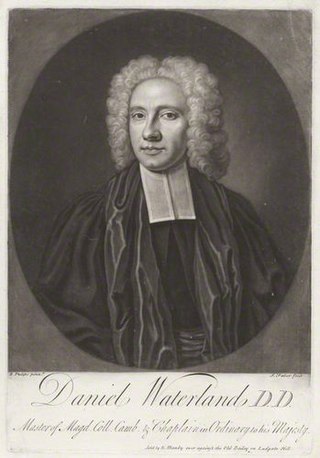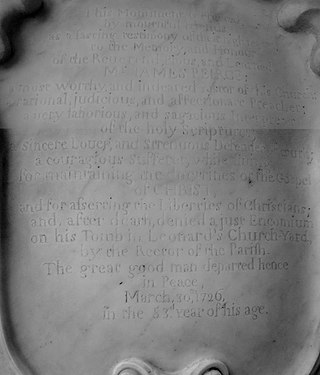Sources
![]() This article incorporates text from a publication now in the public domain : Lee, Sidney, ed. (1898). "Smith, Jeremiah (d.1723)". Dictionary of National Biography . Vol. 53. London: Smith, Elder & Co.
This article incorporates text from a publication now in the public domain : Lee, Sidney, ed. (1898). "Smith, Jeremiah (d.1723)". Dictionary of National Biography . Vol. 53. London: Smith, Elder & Co.
Jeremiah Smith (died 1723), divine, was minister of a congregation at Andover, Hampshire, and in 1708 became co-pastor with Samuel Rosewell of the Silver Street Presbyterian Chapel, London. He took a prominent part in the Salters' Hall debates in 1719 concerning the Trinity, and was one of four London ministers who wrote The Doctrine of the Ever Blessed Trinity stated and defended. He was author of the portion relating to the Epistle to Titus and the Epistle to Philemon in the continuation of Matthew Henry's ‘Exposition,’ and published, with other discourses, funeral sermons on Sir Thomas Abney (1722) and Samuel Rosewell (1723). He died on 20 Augustus 1723, aged nearly seventy.
Matthew Clarke preached and published a funeral sermon.
![]() This article incorporates text from a publication now in the public domain : Lee, Sidney, ed. (1898). "Smith, Jeremiah (d.1723)". Dictionary of National Biography . Vol. 53. London: Smith, Elder & Co.
This article incorporates text from a publication now in the public domain : Lee, Sidney, ed. (1898). "Smith, Jeremiah (d.1723)". Dictionary of National Biography . Vol. 53. London: Smith, Elder & Co.

John Taylor (1694–1761) was an English dissenting preacher, Hebrew scholar, and theologian.

Samuel Chandler was an English Nonconformist minister and pamphleteer. He has been called the "uncrowned patriarch of Dissent" in the latter part of George II's reign.

Daniel Waterland was an English theologian. He became Master of Magdalene College, Cambridge in 1714, Chancellor of the Diocese of York in 1722, and Archdeacon of Middlesex in 1730.
James Foster was an English Baptist minister.
John Asty was an English dissenting clergyman.
Joseph Boyse was an English Presbyterian minister in Ireland, and controversialist.

Thomas Bradbury (1677–1759) was an English Dissenting minister.
Joshua Bayes (1671–1746) was an English Nonconformist minister.
Thomas Bennet (1673–1728) was an English clergyman, known for controversial and polemical writings, and as a Hebraist.

James Peirce (1674?–1726) was an English dissenting minister, the catalyst for the Salter's Hall controversy.
Samuel Fairclough (1594–1677) was an English nonconformist divine.
Benjamin Fawcett (1715–1780) was an English dissenting minister.
Samuel Fancourt (1678–1768) was a dissenting minister and projector of circulating libraries. He is said to have been a native of Hungerford, in Berkshire, England.

William Tong (1662–1727) was an English Presbyterian minister, at the heart of the subscription debate of 1718.
Jabez Earle, D.D. (1676?–1768), was an English Presbyterian minister. He had a career of nearly 70 years as a London preacher.
William Harris, D.D. was an English Presbyterian minister.
Reverend Walter Rosewell was the Vicar of Doulting, Somerset and later became a Presbyterian Minister at Chatham, Kent. He was sequestered and imprisoned in 1649 for refusing to take the oath of Engagement and for sedition.

Reverend Samuel Rosewell was a Presbyterian minister born at Rotherhithe, Surrey.

Benjamin Grosvenor D.D. was an English dissenting minister.

Ebenezer Pemberton was a colonial American Congregational clergyman, bibliophile, and minister of the Old South Church in Boston from 1700 to 1717. Under his ministry, the church broadened the scope of its worship and increased the privileges of its pupils, but also turned back to Puritan tradition. He wrote thirteen sermons and owned a valuable personal library.